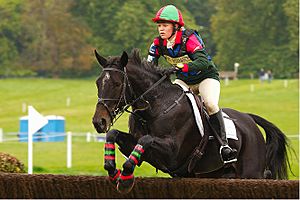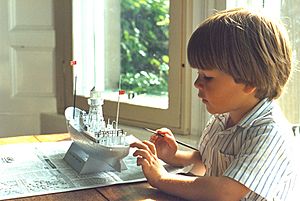Flow (psychology) facts for kids
Flow is a special feeling. It's when you are super focused on an activity. You get so absorbed that you might forget what's happening around you. People often say they are "in the zone" or "in the groove" when they experience flow. It means you are totally into what you are doing.
A psychologist named Mihaly Csikszentmihalyi (say: MEE-hy CHEEK-sent-mee-hy-ee) gave this feeling the name "flow." He found that when people are in flow, they feel a sense of joy and deep focus. They are so busy with the task that they don't even think about themselves or their feelings.
What Makes You Feel Flow?

Mihaly Csikszentmihalyi identified ten things that often happen when someone is in a state of flow. You don't need all of them to feel it, but they often come together:
- Clear goals: You know exactly what you need to do. The rules are clear, and the task feels possible to achieve. It's important that the task is challenging enough, but not too hard for your skills.
- Deep concentration: You are super focused on just one thing. Your mind isn't wandering. You can really dive deep into the activity.
- Losing self-awareness: You forget about yourself. You don't worry about how you look or what others think.
- Time feels different: Your sense of time changes. Hours might feel like minutes, or minutes might feel like hours.
- Immediate feedback: You know right away if you are doing well or if you need to change something. For example, if you are playing a game, you know if you scored or missed.
- Right challenge level: The activity is not too easy and not too hard. It matches your skills perfectly. This keeps you engaged.
- Feeling in control: You feel like you are in charge of the situation or the activity. You know you can handle it.
- Rewarding activity: The activity itself feels good to do. You don't need an outside reward. You do it just because you enjoy it.
- Forgetting bodily needs: You might become so absorbed that you don't notice you are hungry or tired.
- Action and awareness merge: You are so focused that your actions and your thoughts become one. You are just doing the activity without thinking about doing it.
Where Can Flow Happen?
Flow can happen in many different activities. It can be physical, like dancing or playing football. It can also be mental, like playing chess or creating art. People have described feeling flow in competitive sports, but also when they are drawing or writing. Scientists are studying flow to find ways to help people experience it more often. This can be good for personal happiness and even for work.
See also
 In Spanish: Flujo (psicología) para niños
In Spanish: Flujo (psicología) para niños



